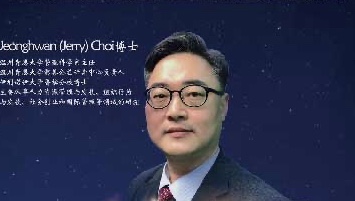Prof. Jerry Choi: Management Paradigm Change under the Covid-19 Crisis.

On June 28, 2020 Impact Investment International Forum jointly hosted by the China Society of Technical Economics and OHT Group, was successfully launched. Prof. Jerry Choi of Management Science Department of Wenzhou-Kean University was invited to give a keynote speech of Management Paradigm Change under the Covid-19 Crisis on July 5th. Dr. Choi believes, the new technology and Covid-19 crisis have reshaped the way of future work, management model and the fundamentals of business, and thus people need to adapt themselves to respond to those dramatic changes.
01 How future work will be?
Dr. Choi believes technologies such as iCloud, big data, loT…enable us work anytime, anywhere, transcending the space and time boundaries. To some degree, Covid-19 is a “chance” that forces employees to work at home, to make the best of technology on Management.
Besides, in the information fragmental era, social media together with other webs have gained unprecedented popularity, the frequent uses of those platforms boosts higher expectations and more personalized behaviors and attitudes, and thus people adopt a more flexible attitude towards working. He believes this will be a new normality in the future.
02 What challenges to management?
Dr. Choi stresses,work change; people change, there are certain challenges to Management as well. While many people expect the traditional organizational structure will be changed into Managerless organization (Holacracy), he inclines that the “Task-Oriented De-centralized Functional Organization” (Adhocracy) will be flourishing to manage ‘decentralized impact investing projects”. A company needs more “Intrapreneurs” than “Managers”.
Instead of “command and control” schema, the connections between managers and employees might adopt “listen and lead” schema. The Covid-19 crisis has shaken the fundamentals of business. It reminds people to re-evaluate personal needs. Instead of material rewards, people nowadays care more about whether their work could give them a sense of purpose, a sense of belonging, a sense of self and a sense of positivity etc.
Traditionally, financial capital, organization capital, social capital, human capital are essential to the success of an organization. However, now who are you? Who you’re becoming? Namely, psychological capital; Do you have energy to perform? Namely, physiological capital and what you are working for, in another word, the sense of purpose, namely, spiritual capital, all together play an increasing crucial role to ensure a well-performed enterprise.
03 How can we respond to such changes?
Dr. Choi is convinced that to balance work and life is critically important amid crisis. To be specific, one need to manage one’s energy instead of time.
This view is also shared by Schwartz back to 2007. Schwartz came forward with four important energies that we need pay attention to, including: physical energy, emotional energy, mental energy and spiritual energy. Those four aspects ensure that people act with sustainability, security, focused mind, and a sense of purpose respectively. To reach the goal, people are encouraged to sleep well, eat well and keep positive, control distractions and follow one’s passion.
It is reported that Dr. Choi got his Ph.D. from the University of Illinois at Urbana-Champaign and is a scholar, practitioner, and business consultant in the fields of human resource management & development, organizational behavior & development. His research interest is “How to get people to work by themselves to create commercial and social values”. He serves as the dean of the Management Science Department of Wenzhou-Kean University and the head of Center for Social Enterprise and Charity(CSEC) in Wenzhou-Kean University. The CSEC works closely with Impact Investment International Forum to provide policy guidance for government agencies, SMEs and social organizations.